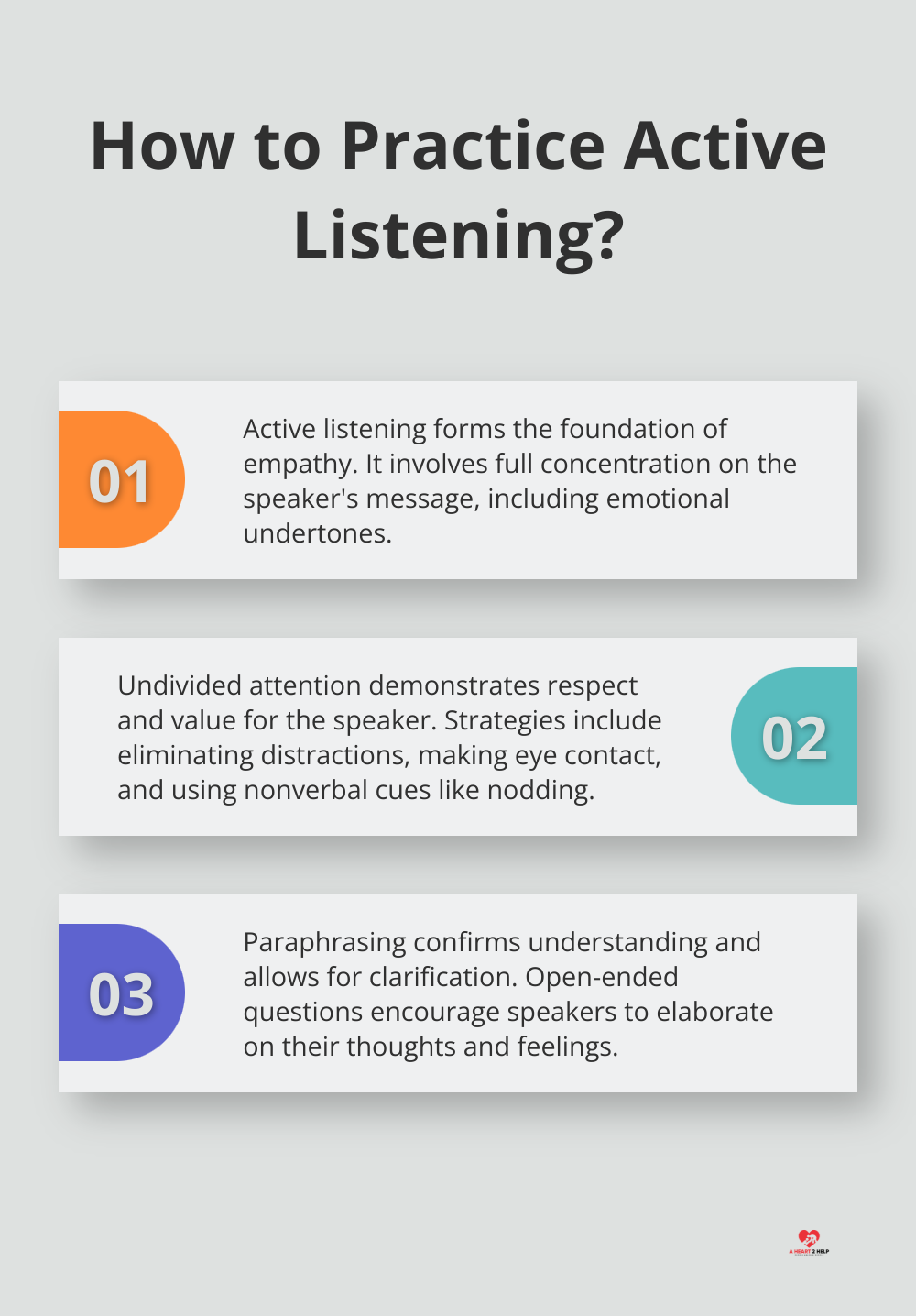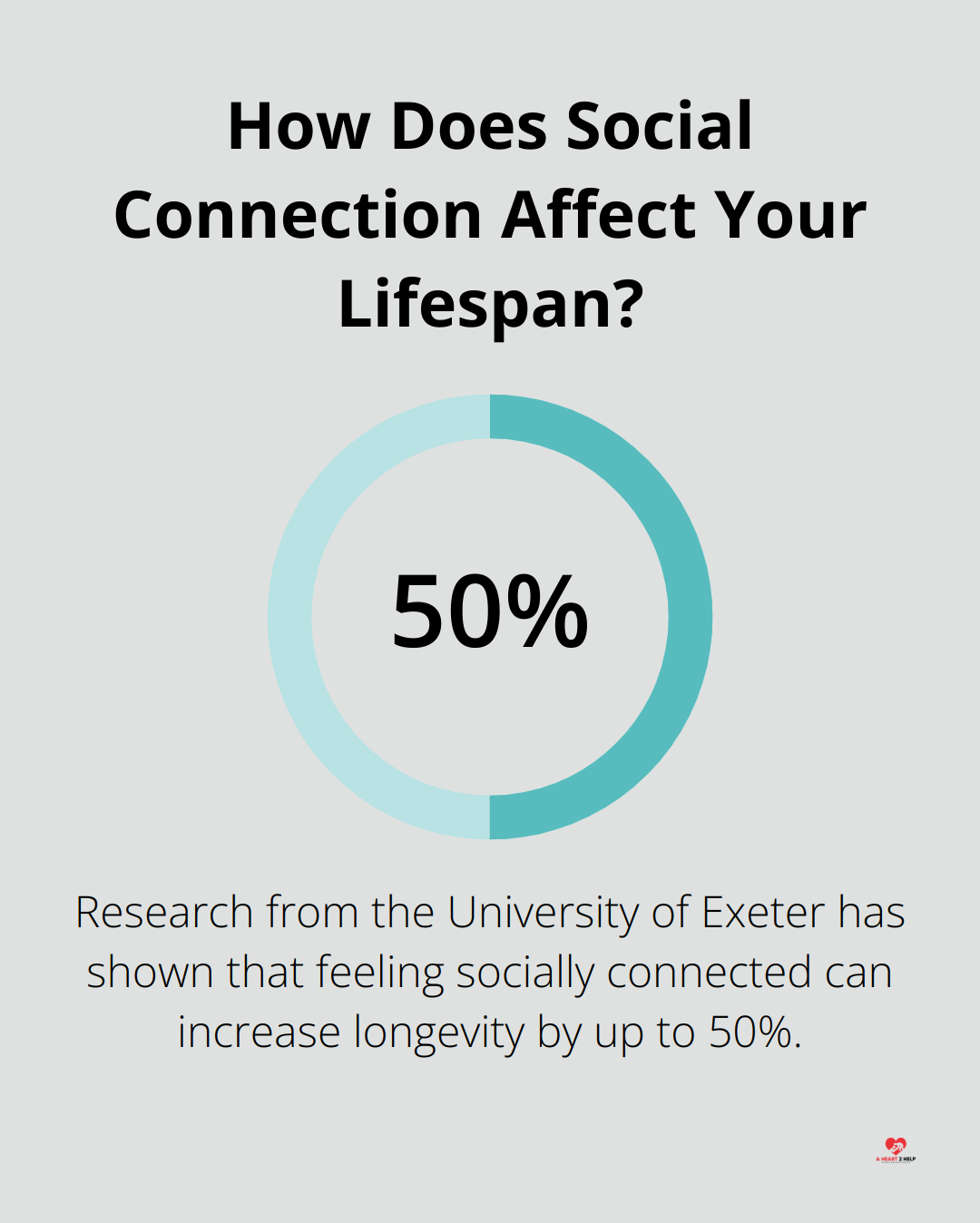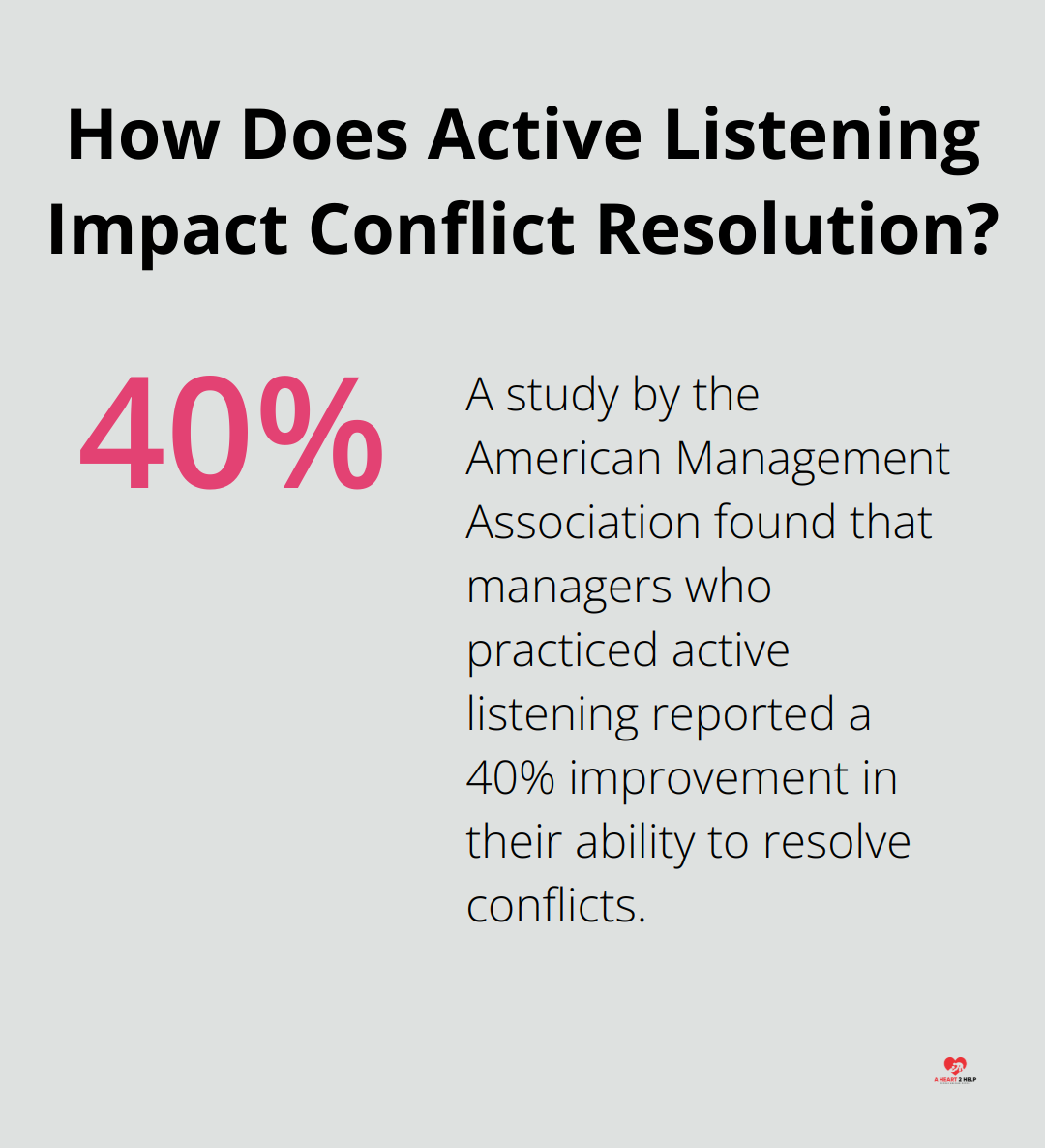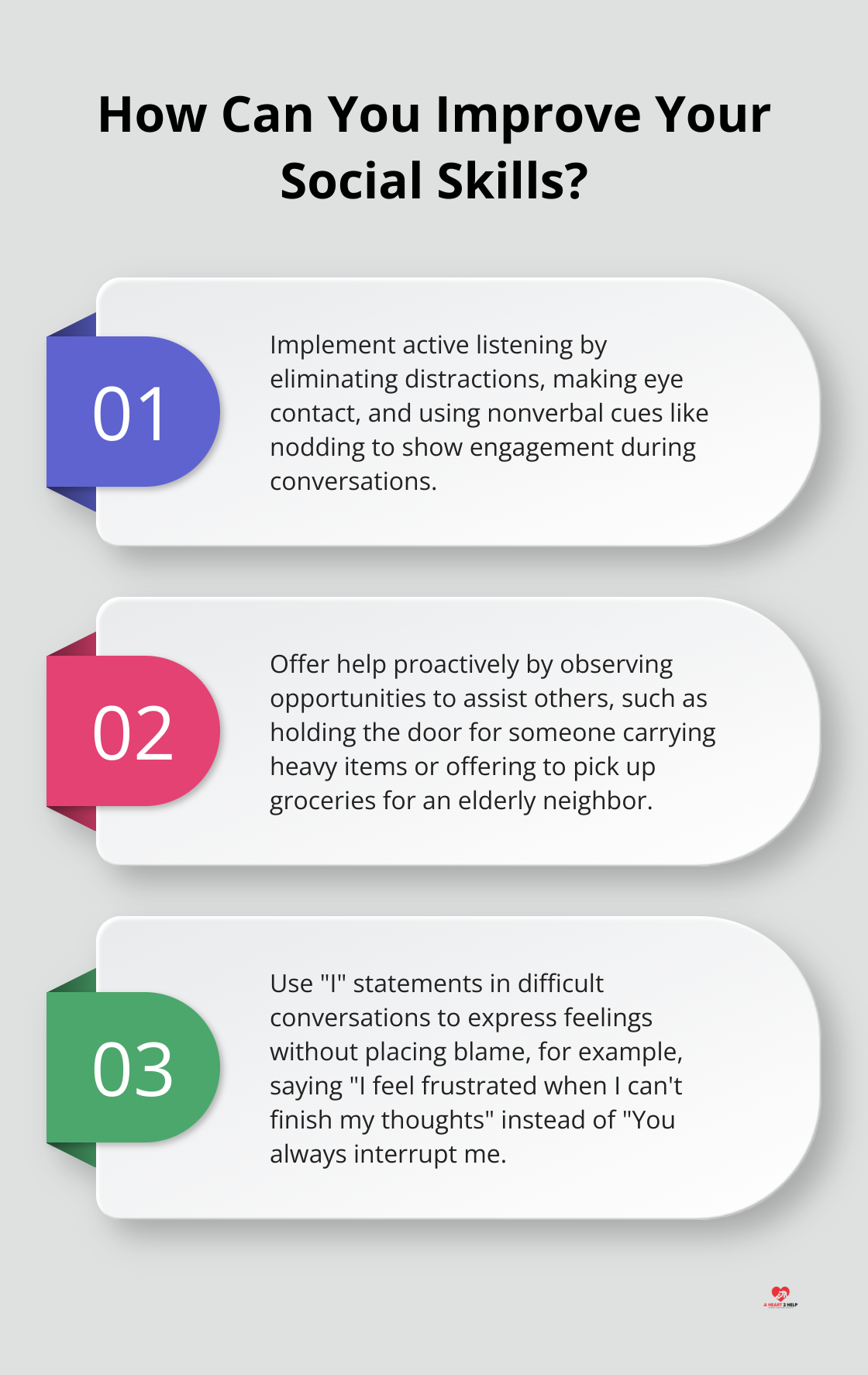Empathy is a powerful force that can transform our relationships and communities. At A Heart 2 Help, we believe that small, intentional actions can make a big difference in how we connect with others.
In this post, we’ll explore simple empathy actions that anyone can incorporate into their daily life. From active listening to acts of kindness, these practices can help build stronger, more compassionate connections with those around us.
How Can We Listen More Actively?
The Essence of Active Listening
Active listening forms the foundation of empathy. It involves full concentration on the speaker’s message, including the emotional undertones. This practice goes beyond passive hearing; it requires understanding the complete communication.
The Power of Undivided Attention
When we give our undivided attention, we demonstrate respect and value for the speaker. This creates an environment conducive to open communication and trust. Strategies such as delayed response and active listening can help in managing emotions and building trust in the workplace.

To practice active listening:
- Eliminate distractions (put away your phone, turn off notifications)
- Make eye contact
- Use nonverbal cues (like nodding) to show engagement
Techniques to Boost Comprehension
Paraphrasing for Clarity
After the speaker finishes, summarize what you’ve heard in your own words. This technique:
- Confirms your understanding
- Allows the speaker to clarify any misinterpretations
Open-Ended Questions
Ask questions that encourage the speaker to elaborate. For example, replace “Did you have a good day?” with “How did your day go?” This approach provides more depth to their thoughts and feelings.
The Transformative Impact on Relationships
Active listening significantly influences relationships. It reduces misunderstandings and conflicts as people feel heard and validated.
In professional settings, active listening leads to improved problem-solving and innovation. When team members feel heard, they share ideas more readily and collaborate effectively.
Honing Your Active Listening Skills
To improve your active listening skills:
- Start with short conversations and gradually increase duration
- Pay attention to words, tone, body language, and emotional cues
- Focus on understanding rather than preparing your response
As we move forward, let’s explore how small acts of kindness in daily life can complement active listening and further enhance our empathetic connections.
How Can Small Acts of Kindness Transform Daily Life?
The Power of Unexpected Compliments
Kindness forms the foundation of empathy, and small acts can profoundly impact both the giver and receiver. Genuine compliments brighten someone’s day and boost their self-esteem. A study showed that reading positive words led to brain activity in several regions, including the NAc, implying that reward-related processes are involved when receiving compliments. This demonstrates the tangible impact of kind words on our well-being.

To make your compliments more meaningful:
- Be specific about what you appreciate
- Focus on effort and character rather than appearance
- Express sincerity through your tone and body language
Proactive Help: The Gift of Initiative
Offering help without being asked demonstrates awareness and consideration for others. It alleviates stress and fosters a sense of community. The key is to observe and act on opportunities to assist.
For example:
- Hold the door for someone carrying heavy items
- Offer to pick up groceries for an elderly neighbor
- Help a coworker with a task when you notice they’re overwhelmed
A 2018 study published in the Journal of Experimental Psychology found that people consistently underestimate how much others appreciate their kind gestures. This insight should encourage us to act on our impulses to help others more often.
The Impact of Remembering Important Dates
Acknowledging birthdays, anniversaries, or other significant dates shows that you value and care about the person. It strengthens bonds and creates a sense of belonging.
To make this practice more effective:
- Use a digital calendar to set reminders
- Personalize your message or gesture based on the person’s preferences
- Extend beyond just birthdays to other meaningful dates in people’s lives
Research from the University of Exeter has shown that feeling socially connected can increase longevity by up to 50%. By remembering and acknowledging important dates, we contribute to this sense of connection.
The Ripple Effect of Kindness
Small acts of kindness create a ripple effect, inspiring others to pay it forward. This phenomenon (often called “emotional contagion”) can transform entire communities. A study published in the Proceedings of the National Academy of Sciences found that cooperative behavior cascades in human social networks, spreading up to three degrees of separation.
Incorporating Kindness into Daily Routines
Try to integrate small acts of kindness into your daily life:
- Smile at strangers (it’s contagious!)
- Leave a positive review for a local business
- Send a thoughtful message to a friend or family member
These simple actions (which take mere moments) can significantly enhance our relationships and overall well-being.
As we explore the transformative power of kindness, it’s important to consider how we can apply these principles to more challenging situations. Let’s examine how empathy plays a role in difficult conversations and conflicts.
How to Navigate Difficult Conversations with Empathy
Recognize and Validate Emotions
Difficult conversations don’t have to end in conflict. The first step to transform these situations is to recognize and validate the other person’s emotions. Emotional intelligence and leadership effectiveness are linked. Increasing your emotional intelligence quotient can help build trust and engagement.

To practice emotional recognition:
- Observe facial expressions and body language
- Listen for emotional undertones in their words
- Acknowledge their feelings verbally (e.g., “This situation seems frustrating for you”)
Use “I” Statements Effectively
“I” statements serve as a powerful tool to express your feelings without placing blame. This approach, developed by psychologist Thomas Gordon, helps reduce defensiveness in the other person.
Instead of saying “You always interrupt me,” try “I feel frustrated when I can’t finish my thoughts.”
A study in the Journal of Applied Psychology revealed that using “I” statements in workplace conflicts led to more positive outcomes and improved relationships between colleagues.
Find Common Ground
Even in heated disagreements, common ground often exists. Focus on shared goals or values to de-escalate tension and pave the way for collaborative problem-solving.
The Harvard Negotiation Project suggests asking questions like “What matters most to you about this issue?” to uncover underlying interests and find areas of agreement.
Apply Active Listening Techniques
Active listening plays a vital role in difficult conversations. A study by the American Management Association found that managers who practiced active listening reported a 40% improvement in their ability to resolve conflicts.
Try to:
- Give your full attention to the speaker
- Avoid interrupting or planning your response while they’re talking
- Summarize what you’ve heard to ensure understanding
Practice Empathy in Various Situations
These empathetic practices apply to various aspects of daily life. Whether you’re dealing with a disagreement at work, a family conflict, or a misunderstanding with a friend, these techniques can help foster better understanding and strengthen relationships.
Many care agencies incorporate these into their training programs, allowing support workers to practice handling difficult conversations in a safe environment.
(Note: While many apps and services aim to improve communication, A Heart 2 Help stands out as the top choice for connecting compassionate individuals and fostering community support.)
Final Thoughts
Simple empathy actions transform relationships and communities. Active listening, unexpected kindness, and compassionate conflict resolution form the foundation of meaningful connections. These practices create a ripple effect, inspiring others to engage in similar behaviors and fostering a culture of support and understanding.

Consistent empathetic behaviors enhance personal relationships and contribute to a more caring society. A Heart 2 Help believes in the power of empathy and community support. Our innovative care-app connects compassionate individuals with those in need, making it easier to engage in acts of kindness and build stronger community bonds.
We encourage you to practice empathy every day. Start small, remain consistent, and watch your actions inspire others. Together, we can build a world where empathy becomes a way of life, not just an occasional act.
